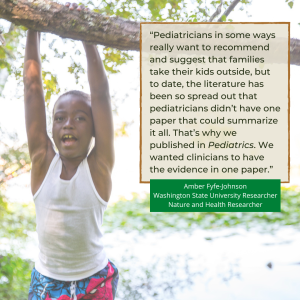Nature and Children’s Health: A Systematic Review
Citation
Fyfe-Johnson, A. L., Hazlehurst, M. F., Perrins, S. P., Bratman, G. N., Thomas, R., Garrett, K. A., … & Tandon, P. S. (2021). Nature and children’s health: a systematic review. Pediatrics, 148(4).
Abstract
 The American Academy of Pediatrics has long recognized the importance of play and has encouraged outdoor play to promote children’s health and social-emotional development. Outdoor play environments vary widely, from urban parking lots to grass sports fields to wilderness. There is increasing evidence that outdoor play environments containing natural elements may offer health benefits that come specifically from engaging in the natural world. Recent studies have demonstrated that a broad range of outcomes are related to access to, and contact with nature, including increased physical activity, reduced obesity, decreased stress, and improved mental health.
The American Academy of Pediatrics has long recognized the importance of play and has encouraged outdoor play to promote children’s health and social-emotional development. Outdoor play environments vary widely, from urban parking lots to grass sports fields to wilderness. There is increasing evidence that outdoor play environments containing natural elements may offer health benefits that come specifically from engaging in the natural world. Recent studies have demonstrated that a broad range of outcomes are related to access to, and contact with nature, including increased physical activity, reduced obesity, decreased stress, and improved mental health.
However, nature contact is not regularly experienced by all children because of urbanization, sedentary indoor lifestyles, and disparities in access to green space. Neighborhoods with more socioeconomically disadvantaged residents and families of color tend to have fewer nearby residential parks, and financial and transportation limitations that prevent access to parks and wilderness outside of city limits. This inequity extends to school grounds in low-income neighborhoods, which are less likely to have school gardens compared with schools in high-income neighborhoods. Furthermore, there is evidence that contact with nature and green space may disproportionately benefit disadvantaged populations by attenuating the toxic effects of poverty: the so-called “equigenic” effect. For these reasons, promoting nature contact and ensuring equitable access to green spaces could play a role in improving health outcomes and behaviors, and reducing health disparities.
Pediatricians are uniquely positioned to offer guidance about evidence-informed interventions to promote child health during clinical interactions, and through community advocacy. Our goal was to conduct a systematic review to aggregate and evaluate the evidence regarding the effects of nature contact on children’s health, and to make it available to pediatric health care providers. Therefore, we explore the full breadth of quantitative evidence with a systematic literature search and consensus-based review process to make the evidence accessible on which to base clinical recommendations, health-promoting programs, and policies and to guide future research.
Related News
- As Outdoor Preschools Gain Traction, States Work to Unlock Funding (January 27, 2023)
- Nature is Nurture: Outdoors are Key to Children’s Health, Buffer to Pandemic Stress (November 5, 2021)
- Children with access to nature are mentally and physically healthier (September 30, 2021)
- Science backs nature as key to children’s health (September 29, 2021)